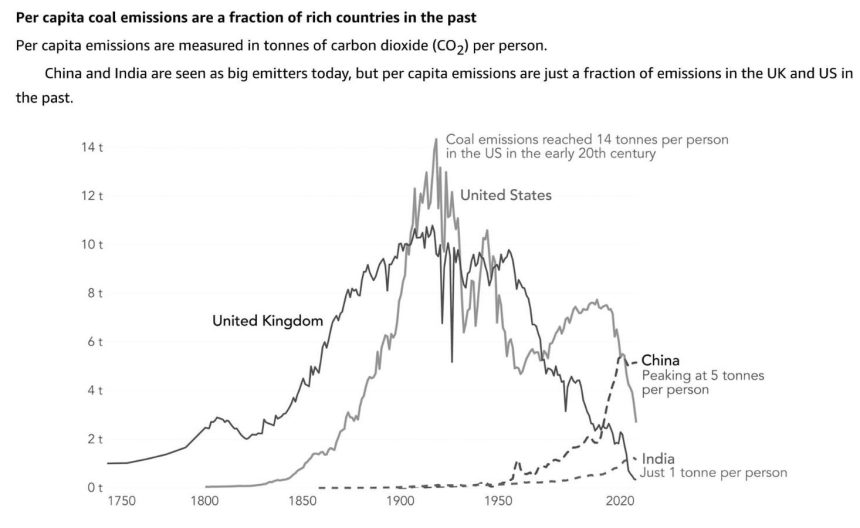Ten years ago Hannah Ritchie thought her future was bleak. A stream of natural disasters and negative environmental news made her feel like there was little hope of creating a sustainable world. Despite having just completed a PhD in Environmental Sciences, she was ready to look for a new career.
Then she saw a Swedish man chasing bubbles on TV.
The man was Hans Rosling, a physician turned statistician with a gift for showing why many of our conceptions about the world are upside down. The bubbles were countries, growing in number and changing colors to demonstrate the extraordinary progress we’ve made in reducing human suffering. As she studied Rosling’s work, Ritchie became convinced that we have the capability to solve our environmental problems as well.
She told me:
He fundamentally changed my mindset. Not from being pessimistic to now I just think everything is amazing, because that was not what Hans Rosling was trying to show…but more into a problem-solving mindset. These are massive problems that we are facing, but we are more than capable of solving problems. How can I contribute to the solutions?
Data Lights The Way
She decided to stay in environmental science and began working at Our World In Data, a non-profit whose mission is to publish research and data to help solve the world’s biggest problems.
She also writes the Sustainability By Numbers Substack and in January published Not The End Of The World, a book that brings together her ideas, data and visuals to show why a sustainable planet is within reach.
Listen to us discuss the book on the latest Ideas Lab podcast and read on for a small sample of her ideas.
China and India Are Getting Greener Faster Than Expected
As countries grow richer they pollute more. But, after a time, improved technology and the demands of a richer populace for a healthy environment, leads to a reversal. Per-person emissions fall first and total emissions follow.
The concern is that by the time the world’s two giant developing countries, China and India, get to the point of falling emissions, it will be too late. But evidence is mounting that China and India are getting greener sooner than expected. One example from the book is the graph below which shows per-person emissions from coal. Both China and India have already peaked – at a much lower rate than the UK or US and over a much shorter time horizon.
Almost daily there is news of China’s shocking pace of renewable power installation, which has them on pace to reach peak emissions within five years.
Wait. Isn’t China still building new coal plants? Yes, but Ritchie says that doesn’t mean they will get used much. She thinks they are mostly there as an energy security backup, and to handle periods when power from other sources isn’t adequate.
Electrify Everything
My short summary of Ritchie’s recommendations: electrify everything using the lowest-carbon source of energy.
Solar and wind are her preferred choices. They have tiny emissions, but don’t generate power all the time. Improved battery technology will help, but to achieve sustainability we need other low-carbon sources as well.
Ritchie supports nuclear power – it has the same emissions as solar and produces power all the time. Her graph below shows that despite its reputation, death rates from accidents and pollution for nuclear are far lower than fossil fuels.
China understands this and is one of the few countries still building nuclear power generation in scale. The West should follow its lead.
About twelve percent of global emissions come from road transport and that’s why she thinks EV adoption powered by low-carbon energy is critical. One argument we often hear against EVs is that they aren’t really greener than petrol vehicles because of the emissions generated in mining and shipping the minerals that make their batteries.
That would be true if EVs were never actually driven.
Once you start driving, EVs become greener pretty fast. They have zero emissions and vastly superior energy efficiency. In a normal car about 80 cents of every dollar spent on petrol gets wasted as heat. EV numbers are the opposite – most of the money spent on charging the battery actually goes toward turning the wheels.
Don’t Shoot The Messenger: Inconvenient Truths About Food And Plastic
Ritchie’s book is apolitical. She lets the data talk and the words are sometimes surprising and uncomfortable.
Organic food might be good for you, but it isn’t necessarily good for the environment. The reason – it takes more land to grow organic food and graze free-range, grass-fed animals. More farms and pastures means fewer carbon-soaking forests. This is especially important for meat coming from regions where rainforests have been cleared for grazing.
From an environmental standpoint the most impactful action you can take is following a plant-based diet. This graph from Ritchie’s book shows the dramatic difference in emissions per 100g of protein from key food sources.
Plastic is another area where Ritchie feels we focus on “visible, but meaningless” policies like banning plastic straws. We need plastic – it lowers CO2 emissions by extending food life and therefore cutting waste. And its light weight reduces transport emissions compared to heavier packaging alternatives.
The key environmental issue is reducing plastic waste in the oceans. Developed countries are actually good at this. The most impactful policy they could enact is to invest in advanced waste management infrastructure in developing countries, where most ocean borne plastic originates. She thinks this is doable and is also cautiously optimistic about efforts to remove existing plastic from the oceans.
Guilt-Free Reading Awaits
I particularly liked the book’s lists of ‘things to stress less about’. One of those is how you read: eBook, audio or paper, it doesn’t matter.
So, choose your favorite reading option guilt-free, and find out how you can help us be the first generation to build a sustainable world.
Read the full article here
















